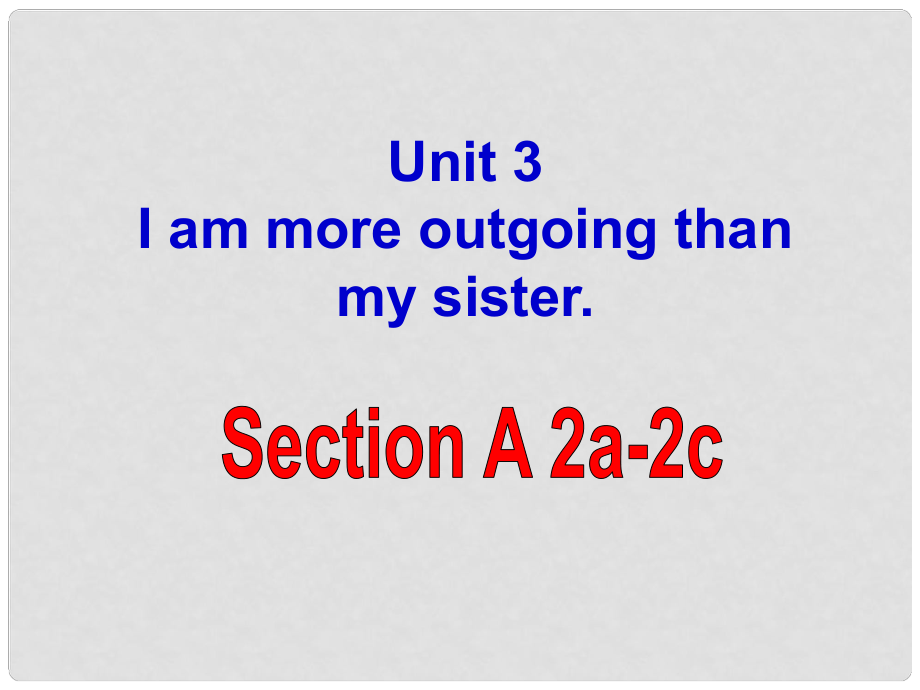《八年級(jí)英語上冊(cè) Unit 3 I’m more outgoing than my sister Section A 2a2c課件 (新版)人教新目標(biāo)版》由會(huì)員分享���,可在線閱讀�����,更多相關(guān)《八年級(jí)英語上冊(cè) Unit 3 I’m more outgoing than my sister Section A 2a2c課件 (新版)人教新目標(biāo)版(31頁(yè)珍藏版)》請(qǐng)?jiān)谘b配圖網(wǎng)上搜索���。
1、Unit 3I am more outgoing than my sister.Language Goals: Talk about personal traits; Compare peopletalltaller1.88m2.26mYao Ming is taller than Liu Xiang.long hairlonger hairLiu Liu YifeiYifei has long has longerer hair hair than YangMiYangMi. .hairNa Ying is thinner than Han Hong.Han Hong is heavier
2�����、than Na Ying.( fatter ) funnyfunnierZhao Benshan is funnier than Xiao Shenyang.outgoingseriousXieNa is more outgoing than Shui Junyi.Shui Junyi is more serious than XieNa .Jordan is tall.Yao Ming is tallerJordan2.26m1.98mthan Jordan.Jordan is Yao Ming.shorter thanLiu Huan is heavy .Fei Mao is heavie
3�、r80kg90kgthan Liu Huan.pkLiu Huan is Fei Mao.thinnerthan3,800,0003,200,000The white car is more expensive than the red car.The red car is cheaper than the white car.Lucy more outgoing outgoingLily Lucy and Lily are twins.Lucy is outgoing, but Lily is more outgoing.Task42a Listen. Are the words in th
4、e box used with ( i)er or more? Complete the chart.funny (run) fastfriendly (jump) highoutgoing (work) hardhard- working (get up) earlysmartlazy-er -iermorefriendlyOutgoingfunnysmartlazy(run) fast(jump) high(work) hard(get up) earlyhard- working2b Listen again. How are Tina and Tara different? Fill
5��、in the boxes.Tina Tara more outgoing.works as hard as Tina.friendlier, funnier, run faster, jump higher, smarter,get up earlierTape scriptInterviewer: Tina, do you think you are different from your sister Tara? Tina: Oh, sure. We look similar but were very different. Interviewer: Really? In what way
6���、s are you different? Tina: Well, Im more outgoing than Tara. Im friendlier and funnier, too. And I love sports.Tara: yes, she can run faster and jump higher than me.Interviewer: Whos more hard-working at school?Tara: Tina thinks she works harder than me, but I work as hard as Tina. But shes smarter
7�����、than me.Tina: Not really. I think Im lazier than Tara. She always gets up earlier than me.形容詞比較級(jí)的形容詞比較級(jí)的 構(gòu)成規(guī)則構(gòu)成規(guī)則1.直接在形容詞后加直接在形容詞后加-er�。 2.以以e結(jié)尾的形容詞直接在其后加結(jié)尾的形容詞直接在其后加-r。tallnice3.以重讀閉音節(jié)結(jié)尾并且末尾只有一個(gè)輔音字以重讀閉音節(jié)結(jié)尾并且末尾只有一個(gè)輔音字母���,應(yīng)先雙寫這個(gè)輔音字母再加母�����,應(yīng)先雙寫這個(gè)輔音字母再加-er.bigshortsmallshorterlarge whiterwhitethinfatterfatsm
8、allerthinnerlargertallernicerbigger形容詞比較級(jí)的形容詞比較級(jí)的 構(gòu)成規(guī)則構(gòu)成規(guī)則4.以以“輔音字母輔音字母+y”結(jié)尾的����,先改結(jié)尾的,先改“y”為為“i”���,再加再加-er��。happy5.多音節(jié)和部分雙音節(jié)形容詞在其前面加多音節(jié)和部分雙音節(jié)形容詞在其前面加more����。loudlyheavierheavyeasiereasymore beautifulbeautifulmore interestinginterestinghappiermore loudlyquietly-more quietly 不規(guī)則變化:不規(guī)則變化: bad / badly/ill worse
9�����、 many / much more good / well better oldolder/elder far farther / further little less合二為一共三對(duì)�����,合二為一共三對(duì),壞壞�����、病病�、兩、兩多多并兩并兩好好一分為二有兩個(gè)���,一分為二有兩個(gè)���,一是一是遠(yuǎn)遠(yuǎn)來二是來二是老老,還有一詞含雙義��,還有一詞含雙義�����,只記只記少少來不記小來不記小寫出下列形容詞的比較級(jí)寫出下列形容詞的比較級(jí).1.tall 2. short 3. fat 4. thin 5.big 6.easy 7.funny 8. heavy9.smart 10.quiet 11.early 12.good 13.m
10�、any 14. far15.little 16.outgoing 17.serious 18.athletic19.late 20.nice2c Student A, look at the chart on the right. Student B, look at the chart on page 81. Ask and answer questions.Sam Tom smarttall*run fastget up early*thinfunny*hard-working *friendlyNote:*Means Sam is taller than Tom. 1. do you t
11、hink you are different from your sister. 你認(rèn)為你不同于你的姐姐嗎�����?你認(rèn)為你不同于你的姐姐嗎? be different from 與與differ from 同義�����,同時(shí)同義�����,同時(shí) 是是differ from的另一種表達(dá)方式���,并且比的另一種表達(dá)方式,并且比 differ from更為口語化���。更為口語化��。 如:如:American cars are different from ours. = American cars differ from ours.Explanation 2. we look similar, but were very diffe
12���、rent. look similar 看上去相似看上去相似 look the same 看上去一樣看上去一樣 look like 看上去像看上去像 look alike 看上去相像看上去相像 3. Both Tom and Sam can play the drums, but Sam plays them better than Tom. 1) both“兩個(gè)、兩者都兩個(gè)���、兩者都”, 在句中在句中 可作代詞���、形容詞���、副詞、連詞����。可作代詞�、形容詞、副詞��、連詞�。 作副詞時(shí)常放在作副詞時(shí)常放在be動(dòng)詞之后動(dòng)詞之后, 實(shí)義實(shí)義 動(dòng)詞之前。動(dòng)詞之前�。e.g. Both (of) his parents
13、 are doctors. (作代詞或形容詞作代詞或形容詞)=His parents are both doctors. (作副詞作副詞)They both went camping in the holiday. (作副詞作副詞)Both English and math are very important. (both and短語常連接兩個(gè)并列的成分短語常連接兩個(gè)并列的成分, 可連接名詞��、動(dòng)詞��、形容詞和代詞等可連接名詞����、動(dòng)詞、形容詞和代詞等) 注注: both指兩者都指兩者都, all指三者或三者以上都���。指三者或三者以上都���。6. 劉昂比我胖����。劉昂比我胖�。Liu Ang is _(fat)
14、 than me. 7.我比我的哥哥外向�����。我比我的哥哥外向����。I am _(outgoing) than my brother.8.文斯比我活躍�����。文斯比我活躍��。Vince is _(athletic) than me .fattermore outgoing more athletic 5.特得比凱有意思����。特得比凱有意思。 Ted is _(funny) than Kay.funnierBetter later than never.Facts(事實(shí))事實(shí))speaks louder than words.Enough is better than too much.Two heads are better than one.Blood(血血) is thicker(稠,濃)稠����,濃)than water.亡羊補(bǔ)牢,亡羊補(bǔ)牢����,猶未晚也猶未晚也事實(shí)勝于雄辯事實(shí)勝于雄辯知足常樂知足常樂三個(gè)臭皮匠頂個(gè)諸葛亮三個(gè)臭皮匠頂個(gè)諸葛亮血濃于水血濃于水Additional workHomework 1. Compare one of your friends with you to find your similarities and differences, then write them down.2. Preview the words of this unit.
 八年級(jí)英語上冊(cè) Unit 3 I’m more outgoing than my sister Section A 2a2c課件 (新版)人教新目標(biāo)版
八年級(jí)英語上冊(cè) Unit 3 I’m more outgoing than my sister Section A 2a2c課件 (新版)人教新目標(biāo)版

